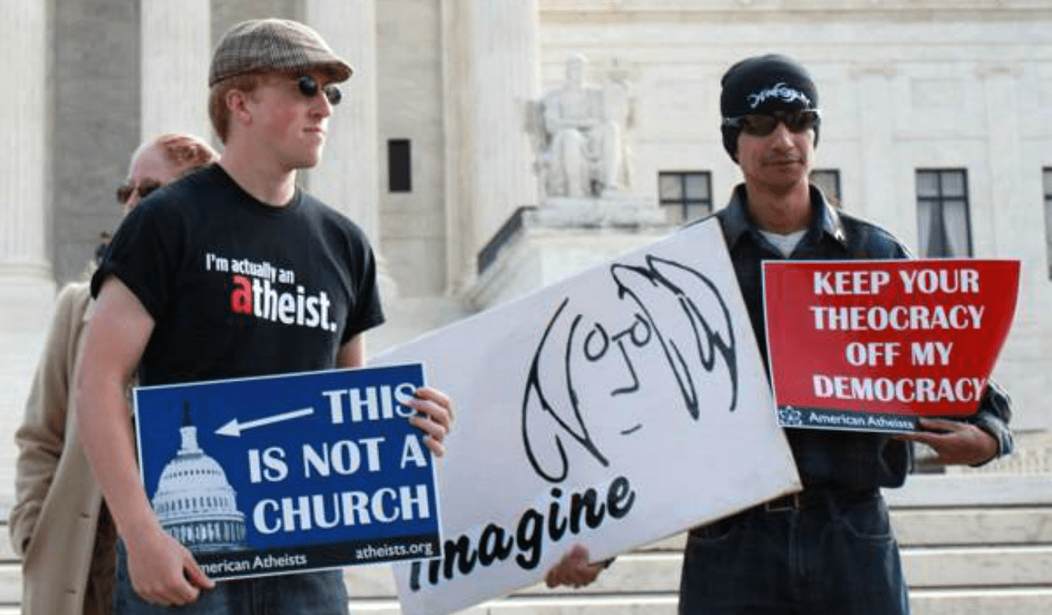Atheists, agnostics, and the religiously unaffiliated have announced that their time has come in American politics. The Secular Coalition for America aims to unite the religious “nones” into a voting bloc to sway candidates on the local, state, and national levels.
“I personally think that this is going to be the last presidential election where we are going to not hear more about the nontheist community,” the Secular Coalition’s President Larry Decker told The Washington Examiner. “I wanted to make sure that we were letting other nontheistic people out there know that there are open atheist and agnostic and humanist candidates who are running for office.”
The Secular Coalition aims to promote openly secular candidates, a drive which Decker compared to the efforts of abortion or LGBT groups to bolster pro-choice or openly gay candidates. Their Secular Values Voter webpage listed candidates from 13 states.
A Pew Research Center study last year found that the religiously unaffiliated had grown tremendously between 2007 and 2014. While they only represented just over 16 percent of the American population in 2007, religious “nones” reached nearly 23 percent in 2014. Among registered voters, they constitute nearly 20 percent.
Another Pew poll in July found that a full two-thirds of the religiously unaffiliated (those who describe their religion as “atheist,” “agnostic,” or “nothing in particular”) are lining up behind Hillary Clinton in opposition to Donald Trump. While this is the same level of support enjoyed by President Obama against Mitt Romney at this time in 2012, but these voters are less enthusiastic about Clinton (26 percent strongly support her) than they were about Obama then (37 percent strongly supported him).
Evangelical voters are falling behind Trump at similar levels — and even more strongly than they did for Romney. In 2012, nearly 75 percent of white evangelical Protestants said they planned to vote for Romney, and 25 percent “strongly” supported him. In July of this year, 78 percent of these voters say they would vote for Trump, and about a third “strongly” support him.
Religious “nones” were among the strongest Sanders supporters during the primaries, but a full 87 percent of those who backed the Vermont Senator said they would vote Clinton over Trump.
Next Page: What policies and candidates does the Secular Coalition for America support?
The Secular Coalition has graded the four presidential candidates, and it may come as no surprise that Clinton scored an A, as did Green Party nominee Jill Stein. Libertarian Party nominee Gary Johnson got a B, and Donald Trump received an F for his efforts to court evangelical voters.
Dave Campbell, a political science professor at the University of Notre Dame, told the Examiner that secular voters already play a “strong but quiet, or largely unacknowledged role” in American politics, “particularly within the Democratic coalitions.” He described many of those who supported Vermont Senator Bernie Sanders during the Democratic primary as “highly secular.”
“They didn’t necessarily put opposition to the mixture of church and state as their top issues,” the professor explained. “Their top issues would be more economic. But if you look at their actual belief system, they’re much more likely to be secular than are Hillary [Clinton] supporters, and of course they’re a very important part of the activist base of the Democratic Party.”
Nevertheless, the Secular Coalition’s website does not emphasize economic issues. The organization’s issue page reads like anti-religious paranoia. Here are some examples:
Health and Safety: The health and safety of an individual should not be compromised by the religious beliefs of another person or group.
Education: Children should not be subjected to religious education or exercises in our public schools.
Discrimination: Personal religious beliefs do not justify prejudicial actions that violate discrimination laws.
What religious beliefs are compromising the health and safety of non-religious people? Is this a veiled reference to abortion? If so, I would point out that not all religious people oppose abortion, and that many conservatives oppose the practice based on scientific reasons.
Most public schools do not force religious education or exercises, but many would argue that a basic education in religion is beneficial. Would the organization push to outlaw private religious schools? One of its stated goals is to remove any tax exemptions for “religious organizations and individuals.”
Finally, it is a mistake to think that proponents of religious freedom stand for “prejudicial actions that violate discrimination laws.” In cases like that of Aaron and Melissa Klein, a bakery refused to craft a cake for a public event that would violate the owner’s conscience. They did not refuse to serve lesbians because of their sexual identity, but they did refuse to partake in a public event. This was a refusal to engage in effective speech, not a refusal to serve specific people.
In an email to 100,000 pastors engaged in the American Renewal Project, evangelical organizer David Lane responded to this secular movement in American politics.
“Our ancestors refused to retreat from confrontation in the public square,” Lane declared. “They recognized that turning over the making, enforcement, and adjudication of laws to nonbelievers would contribute to ‘widespread, systemic, violations of law’ leading to anarchy; a consequence of the disinclination of the Church to engage the culture in the public square.”
Lane convinced over 500 pastors to run for political office in 2016. “Somebody’s values are going to reign supreme: our values or their values,” he told the Times last year. “If our people are not voting, and are not being salt and light, and not engaging at the public square, the other side’s values are going to reign supreme.”
The Secular Coalition might respond, “bring it on.”








Join the conversation as a VIP Member